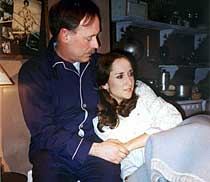A man walks into the fading light of late
afternoon. A church bell tolls. A violin wails. Director Susan
Montez wastes no time in setting the sorrowful tone of Frances
Goodrich and Albert Hackett’s Pulitzer Prize-winning play "The
Diary of Anne Frank," now at the Heights Players.
The play, based on the diary found in the Frank family’s hiding
place in Amsterdam by Anne’s father, Otto Frank, after he was
liberated from a concentration camp, opened on Broadway at the
Cort Theatre in October 1955, and won just about every award
theater has to offer, including the Drama Critics Circle Award
and the Tony Award.
The Heights Players’ revival proves the play is as profoundly
moving and meaningful today as it was a half-century ago.
The play dramatizes segments from Anne’s diary, which she recorded
from July 1942 until the family’s discovery and capture in August
1944. It is a vivid depiction of the daily interactions of the
inhabitants of an attic hideout: Otto and his wife, Edith, and
their daughters Margot and Anne; Mr. and Mrs. Van Dam and their
son, Peter; and Mr. Dussel, a dentist who moves in a while later.
Cooped up in these tight quarters, afraid they will be caught
at any moment, suffering from lack of food, these people are
sometimes heroic and self-sacrificing, often petty, venal and
cowardly. None are spared from the sharp eye of the young diarist
or the brilliant dramatists.
Mrs. Van Dam (Lois Look) is a vain creature, whose most precious
possession is a fur coat she no longer needs. Mr. Van Dam (John
Dowling) steals food when everyone is sleeping. Peter (David
Eason Smith) is a surly and sullen lad who shows affection for
no one but his cat. Margot (Heather Lynn) is quiet and good,
but doesn’t have much of a role in the play. Mr. Dussel (Steve
Platt) is forever complaining, accusing and predicting disaster.
Even Anne (Lana Faye Taradash) does not escape criticism. She
is a spoiled, self-absorbed teenager who doesn’t know when to
keep her mouth shut or what to say while it is open.
In fact, the only people who are really impressive, aside from
the real heroes, the noble Miep Gies (Kellie Aiken) and Mr. Kraler
(Charles Hampton) who have undertaken the difficult and dangerous
task of hiding and feeding these eight helpless and doomed Jews,
are the selfless and dignified Otto (Phillip Bartolf) and his
careful and caring wife, Edith (Deborah Paulter).
But something miraculous happens during the course of this play.
Despite her privation, despite her fear, despite the turmoil
her body and soul are going through, Anne manages to mature.
It is Anne who gives everyone a personal gift for Hannukkah.
It is Anne who is Peter’s sole comfort as he suffers from his
parents’ constant bickering and his own feelings of anger and
degradation.
And it is Anne who writes those immortal words, "In spite
of everything, I still believe people are really good at heart."
If "The Diary of Anne Frank" is proof, perhaps even
better than Jean Paul Sartre’s existentialist play "No Exit,"
that indeed "hell is other people," it is also a wonderful
dramatization of a young girl’s coming-of-age. The tragedy is
that she comes of age only to die a terrible death in an age
that has somehow lost its moral compass. Anne (1929-1945) died
of typhus in the concentration camp at Belsen.
The cast is so consistently excellent in this production, it
almost seems unfair to single out any of the actors for special
recognition. Yet one would be remiss not to mention the stunning
performance of Taradash (previous Heights Player roles include
Millie in "Picnic," Kay Strange In "Towards Zero"
and Justine in "Frankenstein"), who makes Anne seem
as ordinary as she is special; Bartolf, whose controlled performance
echoes the discipline that must have characterized the real Otto;
and Paulter, whose performance here is as unforgettable as the
one she delivered as the mother in "I Remember Mama."
The play would not have been nearly as successful without Heather
Kristin’s original violin music, which adds great emotional depth
to the play, and Robert J. Weinstein’s lighting, which is sensitive
and superb.
As the Holocaust recedes into the past and new atrocities take
their place, it’s easy and perhaps tempting to forget or trivialize
the suffering of those who came before us. Plays like "Anne
Frank" are necessary not because they remind us of what
mankind has done, but because they warn us of what mankind can
do. Even more important, "The Diary of Anne Frank"
teaches us to hope.
The Heights Players production of "The
Diary of Anne Frank" plays through April 18, Friday and
Saturday at 8 pm and Sunday at 2 pm. Tickets are $12, $10 seniors
and students. The Heights Players are located at 26 Willow Place
between State and Joralemon streets in Brooklyn Heights. For
reservations, call (718) 237-2752.

























